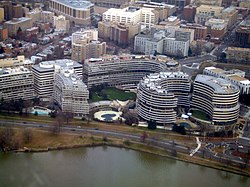United States Senate Watergate Committee
| Watergate scandal |
|---|
 |
| Events |
| People |

The Senate Watergate Committee was a special committee convened by the United States Senate to investigate the Watergate burglaries and the ensuing Watergate scandal after it was learned that the Watergate burglars had been directed to break into and wiretap the headquarters of the Democratic National Committee by the Committee to Re-elect the President, President Richard Nixon's re-election campaign fund raising organization. The formal, official name of the committee was the Select Committee on Presidential Campaign Activities.[1]
The Committee played a pivotal role in gathering evidence that would lead to the indictment of forty administration officials and the conviction of several of Nixon's aides for obstruction of justice and other crimes. Its revelations prompted the introduction of articles of impeachment against the President in the House of Representatives, which led to Nixon's resignation.
The members of the Senate Watergate Committee were:
|
| ||||||||||||||||||||
The Committee had two chief counsels, Sam Dash and Fred Thompson, who advised the Democratic and Republican members of the committee, respectively. Hearings opened on May 17, 1973, and the Committee issued its seven-volume, 1,250-page report on June 27, 1974, entitled Report on Presidential Campaign Activities.
The members of the Senate Watergate Committee’s staff investigators were:
- Donald Sanders (Deputy Minority Counsel - Republican)
- Terry Lenzner, chief investigator[2]
- Scott Armstrong
- Robert Muse
- Marc Lackritz
- Gordon L. Freedman
Hearings
This section needs expansion. You can help by adding to it. (May 2008) |
The first weeks of the committee's hearings were a national politico-cultural event. They were broadcast live during the day on commercial television; at the start, CBS, NBC, and ABC covered them simultaneously, and then later on a rotation basis, while PBS replayed the hearings at night.[3] Some 319 hours were broadcast overall, and 85% of U.S. households watched some portion of them.[3] The audio feed also was broadcast gavel-to-gavel on scores of National Public Radio stations, making the hearings available to people in their cars and workplaces, and giving a major boost to the fledgling broadcast organization.
The hearings made stars out of both Ervin, who became known for his folksy manner and wisdom but resolute determination, and Baker, who appeared somewhat non-partisan and uttered the famous phrase "What did the President know, and when did he know it?" (often paraphrased by others in later scandals). It was the introduction to the public for minority counsel Thompson, who would later become an actor, senator, and presidential candidate. Many of Watergate's most famous moments happened during the hearings, including John Dean's "cancer on the Presidency" testimony and Alexander Butterfield's revelation of the existence of the secret White House Nixon tapes.
References
- ^ Senate Historical Minutes: Watergate Leaks Lead to Open Hearings. United States Senate Historical Office.
- ^ The $100,000 Misunderstanding, Time Magazine, May 6, 1974
- ^ a b Ronald Garay, "Watergate", Museum of Broadcast Communications. Accessed June 30, 2007.
